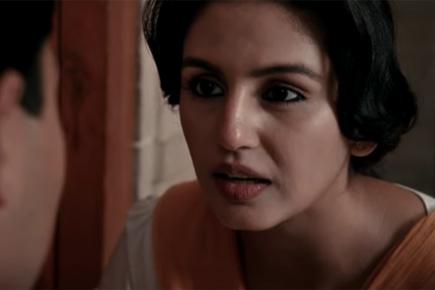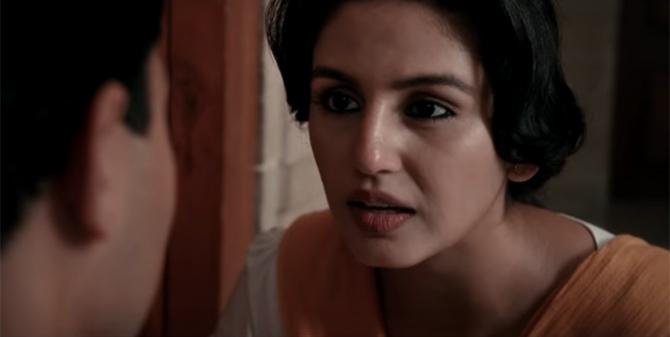'Partition: 1947', set almost wholly inside the Viceroy House (now Rashtrapati Bhawan) looks at the last few days of the Raj, with the sort of predictable nostalgia and faux fondness that might make you squirm


Huma Qureshi in a still from 'Partition: 1947'. Pic courtesy/Youtube
'Partition: 1947'
U/A; History/Drama
Director: Gurinder Chadha
Cast: Huma Qureshi, Hugh Bonneville, Gilian Anderson
Rating:
ADVERTISEMENT
Most movies dealing with history often start with a disclaimer of some sort about having taken creative liberties with places, facts, events, just to be safe. This one begins with the cliché, "History is written by the victors." Which is only a bit befuddling, since in the Partition of 1947, there were really no victors-not the British, who retreated/left; or the Indians, who split; nor Pakistan that got carved out, over deadly politics mixed with religion over a pool of blood, to make it all rather inauspicious.
It's only when you're through with the first few minutes of this film, you realise that a little like the infinitely superior Gandhi (1982), a hagiography partly funded by India, and directed by a Brit, this is a big-budget film essentially extolling the highest virtues in the imperialist Lord Mountbatten and his wife Edwina. It's partly funded by the Brits, and directed by a filmmaker of Indian origin (Gurinder Chadha, best known for the lovely indies Bhaji On The Beach, Bend It Like Beckham).
The film, set almost wholly inside the Viceroy House (now Rashtrapati Bhawan) looks at the last few days of the Raj, with the sort of predictable nostalgia and faux fondness that might make you squirm, observing the generosity of the Empire as Mrs Mountbatten makes kathi rolls for refugees in the kitchen, while India burns, and Mr Mountbatten oversees the Partition plan named after him, not even aware that Cyril Radcliffe-the man entrusted to draw the lines in a month or so-had not even been to India before. It's another matter that Radcliffe hadn't stepped beyond East Paris all his life. But then, such is the white man's burden.
A colonial gaze is apparent throughout this film as you watch hundreds of anpad/gawaar naukars before the benevolent Sahib surveying the majestic Viceroy House. We discuss virtues of serving Indian food to Indians who eat with their hands, over pudding and Lamb Wellington. The crucial conundrum is whether one must fly down a British chef to run the kitchen. Such magnanimity that Mrs Mountbatten chooses not to.
The native Hindus and Muslims on the other hand, even inside the Viceroy House, are at each other's throats. A gora boss is mad at them for this. He gets slapped, and spat on. He quietly bemoans how this doesn't even happen in Glasgow. Wiping off the spit from his face with the handkerchief that a suave Indian butler offers him, he says: "Thank you, my friend!"
It's the same fakery around India's major nationalists that gets your goat. I say this looking at a heavily caricatured Gandhi offer "bakri ki doodh ka dahi" (curd from goat's milk) to the Mountbattens when he visits the Viceroy House. This is all you're likely to learn about him. It's visual history, at a time when history itself, rather than being left to qualified, peer-reviewed historians-as we do with economists, scientists, or should with journalists-is increasingly becoming an object/outcome of conspiracy theories on Facebook, Twitter and Whatsapp.
And so there is Jinnah, almost nudging and winking his way through it all, suggesting that Pakistan was simply a barter deal with Churchill for American/British control of Karachi port. Surely things are a little more complicated than that. What isn't is the nice, little romance going on in this movie's backdrop, between the servants of the Mountbattens-a Hindu boy, and a Muslim girl-and Jinnah's driver, playing party-pooper! Sadly this isn't what the script focuses on.
Basically, I guess, the moment this film steps out of the 'Viceroy House' (which is its English title) into the actual 'Partition, 1947' (the picture's Indian name)-showing destruction, disloyalty, and dispersion over a wider canvas-is when it genuinely comes alive. The question is only if you can last that long. It's the final few minutes of the film. Can you stay up until then? Well, millions died during Partition. Surely you can stay up until a movie by that name ends.
Watch trailer:
 Subscribe today by clicking the link and stay updated with the latest news!" Click here!
Subscribe today by clicking the link and stay updated with the latest news!" Click here!







